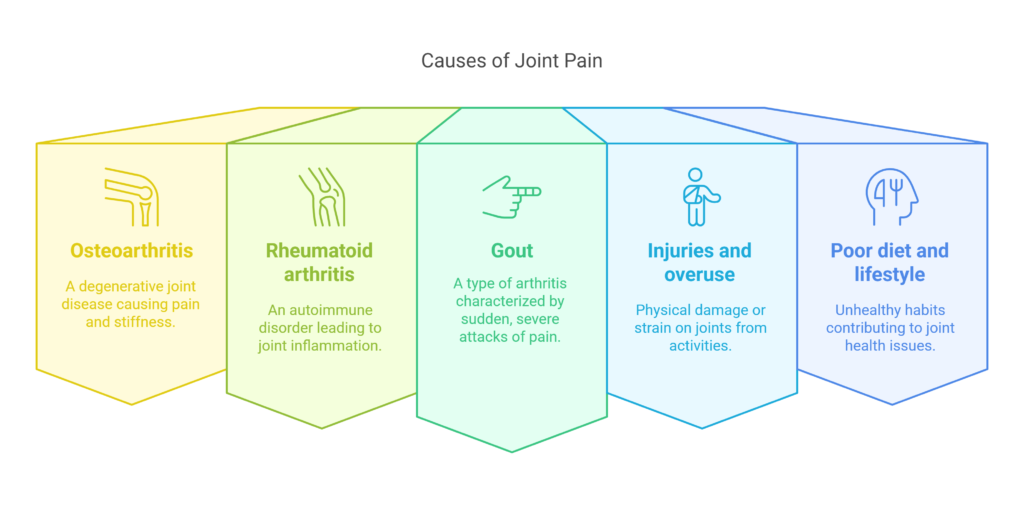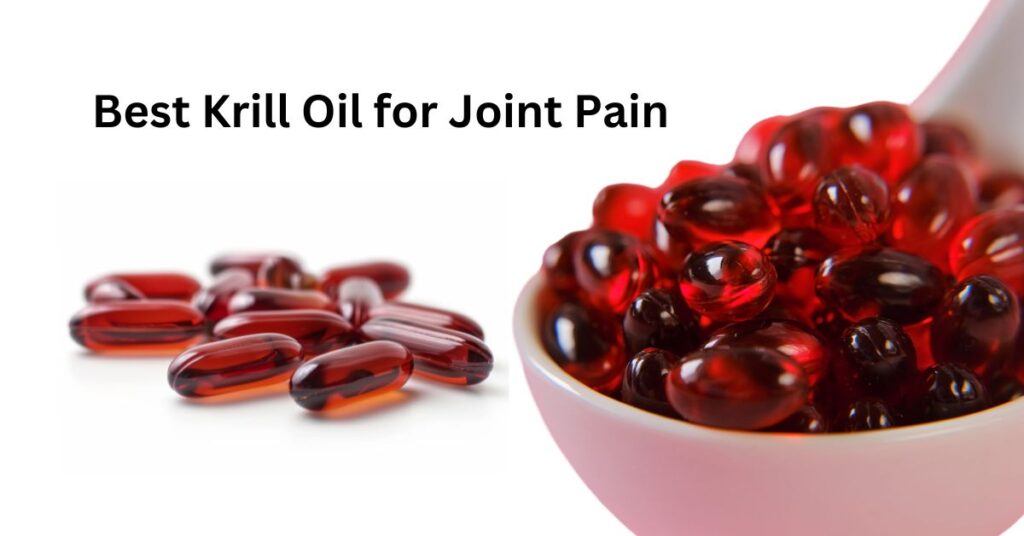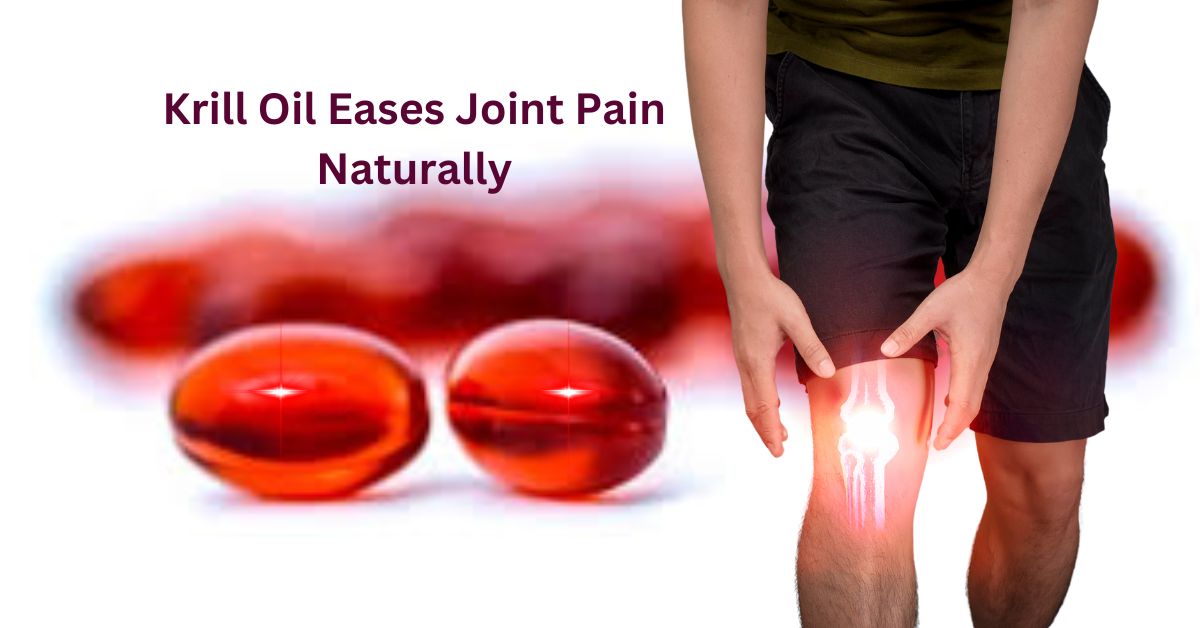Joint pain can make even simple movements feel like a struggle. Whether it’s stiff knees in the morning, aching wrists after a long day, or ongoing discomfort from arthritis, joint issues can affect mobility and overall quality of life. Many people turn to painkillers or traditional supplements, but natural alternatives are gaining attention and krill oil is leading the way.
Krill oil is packed with omega-3 fatty acids, antioxidants, and essential nutrients that help fight inflammation, ease stiffness, and support long-term joint health. Unlike many joint supplements, it works at the source helping to reduce swelling, protect cartilage, and improve flexibility.
But there’s more. Krill oil isn’t just another fish oil alternative; its unique structure makes it easier for the body to absorb, allowing for faster and more effective relief. So, how exactly does it work? What makes it different from other supplements? And how can you use it to keep your joints moving comfortably? Let’s break it all down.
Understanding Joint Pain and Its Causes
Joint pain can be a mild annoyance or a daily struggle, making simple movements feel difficult. It can come and go or stick around for years, getting worse over time. To manage it effectively, it helps to understand what’s behind it.

At its core, joint pain is often linked to inflammation. The body uses inflammation to protect itself, but when it becomes long-term, it starts damaging tissues instead of healing them. This leads to swelling, stiffness, and discomfort that can make even routine tasks feel exhausting.
Some of the most common causes of joint pain include:
- Osteoarthritis – Wear and tear over time causes cartilage to break down, leading to stiffness and pain.
- Rheumatoid arthritis – The immune system mistakenly attacks the joints, causing inflammation and swelling.
- Gout – A buildup of uric acid crystals in the joints, leading to sudden and intense pain.
- Injuries and overuse – Repetitive movements or past injuries can lead to chronic joint discomfort.
- Poor diet and lifestyle – Inflammatory foods, lack of movement, and stress can make joint pain worse.
Since inflammation plays a big role in joint pain, reducing it can make a huge difference. This is where omega-3s come in they help calm inflammation, protect cartilage, and keep joints moving smoothly. Now here comes the good part krill oil is packed with omega-3s and antioxidants that make this process even more effective. Let’s dive into how it works.
How Krill Oil Helps Relieve Joint Pain
Joint pain often comes down to two things: inflammation and wear and tear. Krill oil works by targeting both, helping to reduce swelling, protect cartilage, and keep joints moving smoothly. Let’s break down the key ways it provides relief.

Reduces Inflammation at the Source
Chronic inflammation is a major cause of joint pain, making movement stiff and uncomfortable. Krill oil is rich in omega-3s, which help calm the body’s inflammatory response. By reducing excess inflammation, it helps relieve stiffness and discomfort, making everyday movements feel easier.
Improves Joint Lubrication and Flexibility
Joints need lubrication to move smoothly, just like a well-oiled machine. Krill oil’s phospholipid-bound omega-3s are easily absorbed by the body, helping to maintain the natural oils that keep joints flexible. This means less friction, smoother movement, and reduced stiffness over time.
Protects Cartilage from Wear and Tear
Cartilage acts as a cushion between bones, but over time, it can break down, leading to pain and stiffness. The antioxidants and omega-3s in krill oil help slow this process by protecting cartilage from oxidative stress and inflammation. This is especially beneficial for those with osteoarthritis or age-related joint issues.
Supports Faster Recovery from Joint Strain
Whether it’s from intense exercise or daily wear, joints take a beating. Krill oil helps speed up recovery by reducing post-activity inflammation and supporting tissue repair. This makes it a great option for athletes or anyone with an active lifestyle who wants to keep their joints strong and pain-free.
Eases Morning Stiffness and Everyday Discomfort
Many people with joint pain wake up feeling stiff and achy. Krill oil works to reduce inflammation overnight, helping joints feel more comfortable in the morning. When taken consistently, it can make daily activities like walking, bending, or gripping objects feel more natural and less painful.
Now here comes the good part krill oil doesn’t just mask joint pain; it helps improve joint health from the inside out. Let’s explore how it compares to other joint supplements and why it stands out as a powerful option.
Krill Oil vs. Other Joint Supplements: What Makes It Different?
The market is filled with joint supplements, from fish oil to glucosamine and chondroitin. While many of these options provide relief, krill oil stands out because of its unique structure and additional health benefits. Let’s break down what makes it different.
Krill Oil vs. Fish Oil vs. Other Joint Remedies
| Factor | Krill Oil 🦐 | Fish Oil 🐟 | Glucosamine & Chondroitin 💊 | NSAIDs (Ibuprofen, etc.) ⚠️ |
| Absorption | Fast (phospholipid-bound) ⚡ | Slow (triglyceride form) 🕒 | N/A | N/A |
| Antioxidants | Contains astaxanthin 🔥 | None ❌ | None ❌ | None ❌ |
| Inflammation Relief | Fights at the source 🛡️ | Helps, but less potent ⚖️ | Doesn’t reduce inflammation ❌ | Strong, but with risks ⚠️ |
| Joint Support | Protects cartilage & reduces pain 🤲 | Mainly reduces inflammation 🏋️ | Helps maintain cartilage 👍 | No cartilage benefits ❌ |
| Digestive Comfort | No fishy burps, easy on the stomach 😊 | Fishy aftertaste, possible indigestion 🤢 | Easy to digest ✅ | Can cause stomach issues 🚨 |
| Long-Term Safety | Natural & safe ✅ | Safe ✅ | Safe ✅ | Long-term risks (stomach, liver issues) 🚨 |
Superior Absorption Compared to Fish Oil
Both fish oil and krill oil contain omega-3s, but how the body absorbs them is completely different. Krill oil’s omega-3s are bound to phospholipids, which means they dissolve in water and mix easily with cell membranes. This allows for faster absorption and better use by the body. Fish oil, on the other hand, delivers omega-3s in triglyceride form, which takes longer to break down and absorb.
Natural Astaxanthin for Extra Joint Protection
Unlike most fish oil supplements, krill oil naturally contains astaxanthin, a powerful antioxidant. This helps protect joints from oxidative stress, which contributes to stiffness and cartilage breakdown over time. The combination of omega-3s and astaxanthin makes krill oil a two-in-one solution for joint pain and overall inflammation control.
Easier on Digestion with No Fishy Aftertaste
One common complaint with fish oil is the unpleasant aftertaste and fishy burps. Krill oil doesn’t have this issue because its phospholipids allow for better digestion. This makes it a more convenient option for people who struggle with fish oil’s side effects.
More Effective Than Glucosamine and Chondroitin Alone
Glucosamine and chondroitin are popular for joint health because they help maintain cartilage, but they don’t directly target inflammation. Krill oil reduces inflammation at the source while also supporting cartilage health, making it a more well-rounded option. For even better results, some people take krill oil alongside glucosamine to get the benefits of both.
A Natural Alternative to NSAIDs Without Side Effects
Many people rely on over-the-counter pain relievers like ibuprofen to manage joint pain, but long-term use can lead to stomach issues, liver problems, and other side effects. Krill oil provides a natural way to reduce inflammation and discomfort without these risks, making it a safer option for ongoing joint support.
Now here comes the good part krill oil isn’t just different; it’s a smarter choice for long-term joint health. Let’s look at who can benefit the most from adding it to their daily routine.
Who Can Benefit Most from Krill Oil for Joint Health?
Joint pain doesn’t discriminate. Whether it’s from aging, an active lifestyle, or an underlying condition, discomfort can slow you down. Krill oil offers a natural way to ease stiffness, reduce inflammation, and keep joints moving smoothly. Let’s take a look at who stands to benefit the most.
| Group | How Krill Oil Helps |
| People with Osteoarthritis | Reduces inflammation, protects cartilage, improves mobility |
| Those with Rheumatoid Arthritis | Eases swelling, supports immune balance, reduces flare-ups |
| Athletes & Active Individuals | Aids recovery, reduces joint stress, enhances lubrication |
| Older Adults | Supports flexibility, maintains mobility, reduces stiffness |
| Natural Pain Relief Seekers | Manages inflammation without harsh medications |
People with Osteoarthritis or Stiff Joints
As cartilage wears down, joints lose their cushioning, leading to pain and stiffness. Krill oil helps by reducing inflammation and protecting cartilage from further breakdown. Many people with osteoarthritis find that taking omega-3s regularly improves mobility and makes daily activities easier.
Those with Rheumatoid Arthritis and Autoimmune Joint Conditions
When the immune system mistakenly attacks the joints, inflammation can become a daily struggle. Krill oil’s anti-inflammatory properties help regulate immune responses, easing swelling and discomfort. While it’s not a cure, it can support better joint function and reduce flare-ups.
Athletes and Active Individuals
Exercise is great for overall health, but intense training puts stress on the joints. Krill oil helps with post-workout recovery by reducing inflammation and supporting joint lubrication. It’s especially useful for runners, weightlifters, and anyone engaging in high-impact activities.
Older Adults Looking to Maintain Mobility
Aging naturally brings joint wear, but that doesn’t mean movement has to be painful. Krill oil provides essential nutrients that support joint flexibility and overall mobility. Taking it daily can help older adults stay active and independent for longer.
Anyone Seeking a Natural Alternative to Pain Medications
Long-term use of painkillers like NSAIDs can lead to unwanted side effects. Krill oil offers a natural way to manage inflammation and discomfort without the risks associated with medication. It’s an option for those who want lasting relief without relying on pills.
Now here comes the good part knowing krill oil can help is one thing, but choosing the right supplement and taking it correctly makes all the difference. Let’s dive into how to pick the best krill oil and get the most out of it.
How to Choose and Take Krill Oil for Joint Pain Relief
Krill oil can be a game-changer for joint health, but not all supplements are created equal. Choosing the right one and taking it the right way makes a big difference in how well it works. Here’s what to look for and how to use it for the best results.

Pick a High-Quality Krill Oil
Not every bottle of krill oil delivers the same benefits. Look for one that’s sustainably sourced and certified by organizations like the Marine Stewardship Council (MSC). This ensures the krill are harvested responsibly without harming ocean ecosystems. Also, check for third-party testing to confirm purity and potency this guarantees you’re getting a product free from contaminants like heavy metals.
Check for Phospholipid and Astaxanthin Content
The key to krill oil’s effectiveness lies in its phospholipids, which help your body absorb omega-3s more efficiently. A high-quality supplement should list its phospholipid content clearly on the label. Also, make sure it contains natural astaxanthin this antioxidant not only protects krill oil from spoiling but also helps fight joint inflammation.
Get the Right Dosage
Most studies suggest a daily dose of 500 to 1,000 mg of krill oil for joint support. If your joint pain is more severe, some people find relief with higher doses, but it’s best to start low and adjust as needed. Always follow the recommended serving size on the label and consult a healthcare provider if you’re taking other medications.
Take It with a Meal for Better Absorption
Krill oil absorbs best when taken with food, especially meals that contain healthy fats. This helps your body make the most of its omega-3s. Many people find that taking it in the morning with breakfast sets them up for better mobility throughout the day.
Be Consistent for Lasting Results
Joint relief doesn’t happen overnight. It takes time for omega-3s to build up in your system and start reducing inflammation. Most people notice improvements within a few weeks to a couple of months of daily use. Sticking with it is key taking krill oil regularly provides ongoing support for joint flexibility and long-term comfort.
Now here comes the good part when you choose the right krill oil and take it consistently, you’re giving your joints the support they need to stay strong and pain-free. Let’s wrap things up with a final look at why krill oil is worth making a part of your daily routine.
Conclusion
Joint pain can slow you down, but the right support can keep you moving comfortably. Krill oil offers a natural way to reduce inflammation, ease stiffness, and protect your joints over time. Thanks to its highly absorbable omega-3s, powerful antioxidants, and ability to support long-term joint health, it stands out from other supplements.
Unlike quick-fix pain relievers, krill oil works with your body, helping to calm inflammation and keep joints flexible without the risks of over-the-counter medications. Whether you’re dealing with arthritis, recovering from strain, or simply looking to maintain mobility as you age, adding krill oil to your routine could be a simple and effective solution.
But here’s the key consistency matters. Taking it daily and choosing a high-quality supplement ensures you get the full benefits. With patience and regular use, krill oil can be a game-changer for anyone looking to move with less pain and more ease.








